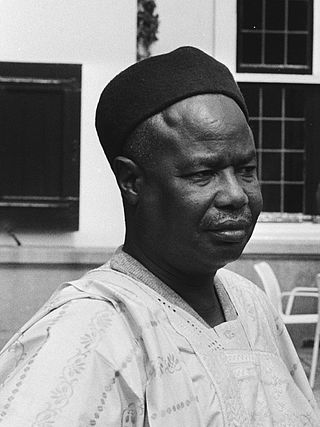| |||||
| Decades: | |||||
|---|---|---|---|---|---|
| See also: | Other events of 1995 List of years in Cameroon | ||||
Events in the year 1995 in Cameroon.
| |||||
| Decades: | |||||
|---|---|---|---|---|---|
| See also: | Other events of 1995 List of years in Cameroon | ||||
Events in the year 1995 in Cameroon.

Cameroon, officially the Republic of Cameroon, is a country in west-central Africa. It is bordered by Nigeria to the west and north; Chad to the northeast; the Central African Republic to the east; and Equatorial Guinea, Gabon and the Republic of the Congo to the south. Its coastline lies on the Bight of Biafra, part of the Gulf of Guinea and the Atlantic Ocean. Due to its strategic position at the crossroads between West Africa and Central Africa, it has been categorized as being in both camps. Its nearly 27 million people speak 250 native languages.
At the crossroads of West Africa and Central Africa, the territory of what is now Cameroon has seen human habitation since some time in the Middle Paleolithic, likely no later than 130,000 years ago. The earliest discovered archaeological evidence of humans dates from around 30,000 years ago at Shum Laka. The Bamenda highlands in western Cameroon near the border with Nigeria are the most likely origin for the Bantu peoples, whose language and culture came to dominate most of central and southern Africa between 1000 BCE and 1000 CE.
"Chant de Ralliement", also known as "Ô Cameroun berceau de nos ancêtres" is the national anthem of Cameroon and former national anthem of French Cameroon.

Paul Biya is a Cameroonian politician who has served as the president of Cameroon since 6 November 1982. He is the second-longest-ruling president in Africa, the longest consecutively serving current non-royal national leader in the world and the oldest head of state in the world.

The Cameroon People's Democratic Movement is the ruling political party in Cameroon. Previously known as the Cameroonian National Union, which had dominated Cameroon politics since independence in the 1960s, it was renamed in 1985. The national president of the CPDM is Paul Biya, the president of Cameroon, while the secretary-general of the party Central Committee is Jean Nkuete.

The Social Democratic Front is the main opposition party of Cameroon. It is led by Ni John Fru Ndi and receives significant support from the Anglophone regions of the western part of the country.

Ahmadou Babatoura Ahidjo was a Cameroonian politician who was the first President of Cameroon, holding the office from 1960 until 1982. Ahidjo played a major role in Cameroon's independence from France as well as reuniting the French and English-speaking parts of the country. During Ahidjo's time in office, he established a centralized political system. Ahidjo established a single-party state under the Cameroon National Union (CNU) in 1966. In 1972, Ahidjo abolished the federation in favor of a unitary state.

Ambazonia, alternatively the "Federal Republic of Ambazonia" or "State of Ambazonia", is a political entity proclaimed by Anglophone separatists who are seeking independence from Cameroon. The separatists claim that Ambazonia should consist of the Northwest Region and Southwest Region of Cameroon. Since 2017, Ambazonian rebels are in an armed conflict with the Cameroonian military, in what is known as the Anglophone Crisis, setting up a government-in-exile and capturing some territory. No country has recognized Ambazonia's existence as of 2023.
An attempted coup d'état occurred in Cameroon in 1984, when presidential palace guards unsuccessfully tried to overthrow President Paul Biya. The fighting that resulted began on April 6, 1984, and ended several days later. The coup attempt is widely viewed as one of the most crucial events in the history of Cameroon since independence in 1960.

Chantal Biya is the first lady of Cameroon.

Elvis Ngolle Ngolle is a Cameroonian politician and a professor, who lastly served in the government of Cameroon as Minister of Forestry and Wildlife. He had been a member of the government since 1997.

Presidential elections were held in Cameroon on 12 October 1997. They were boycotted by the main opposition parties, the Social Democratic Front, the National Union for Democracy and Progress, and the Cameroon Democratic Union, as well as the smaller African Peoples Union. As a result, incumbent President Paul Biya was re-elected with 92.57% of the vote. Voter turnout was 83.1%.

General elections were held in Cameroon on 24 April 1988 to elect a President and National Assembly. The country was a one-party state at the time, with the Cameroon People's Democratic Movement as the sole legal party. Its leader, incumbent Paul Biya was the only candidate in the presidential election, and was re-elected unopposed.

Presidential elections were held in Cameroon on 14 January 1984. The country was a one-party state at the time, with the Cameroonian National Union as the sole legal party. Its leader, Paul Biya, was the only candidate in the election, and won unopposed. Voter turnout was 97.7%.

Presidential elections were held in Cameroon on 11 October 1992. They were the first presidential election since multi-party politics had been legalised, and were also the first to feature more than one candidate. Incumbent Paul Biya won with 39.98% of the vote. Voter turnout was 71.9%.

Félix Sabal Lecco was a teacher, politician and diplomat representing Cameroon. His son, also called Félix Sabal Lecco, is a well-known drummer. Two other sons, Armand and Roger both became bass players.

The Liberty Movement of Cameroon Youth was a political party in Cameroon led by Dieudonné Tina.
Events in the year 1985 in Cameroon.
Events in the year 1992 in Cameroon.
Events in the year 1986 in Cameroon